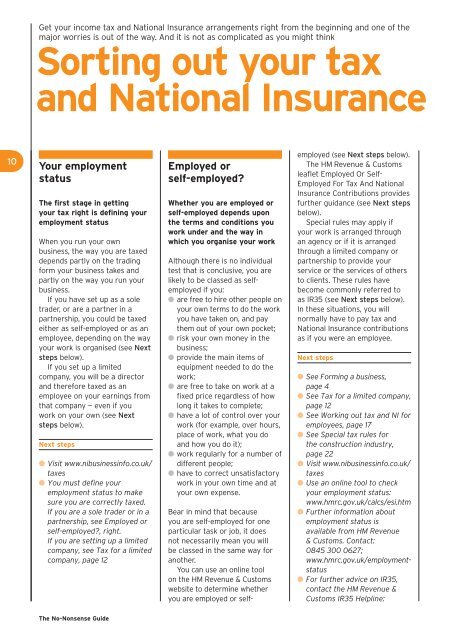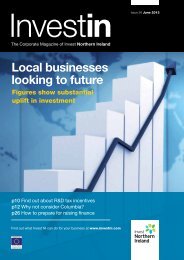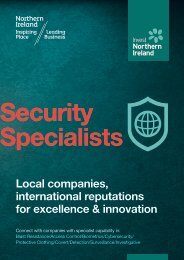Invest NI No Nonsense Guide 11 (PDF) - Invest Northern Ireland
Invest NI No Nonsense Guide 11 (PDF) - Invest Northern Ireland
Invest NI No Nonsense Guide 11 (PDF) - Invest Northern Ireland
You also want an ePaper? Increase the reach of your titles
YUMPU automatically turns print PDFs into web optimized ePapers that Google loves.
Get your income tax and National Insurance arrangements right from the beginning and one of themajor worries is out of the way. And it is not as complicated as you might thinkSorting out your taxand National Insurance10Your employmentstatusThe first stage in gettingyour tax right is defining youremployment statusWhen you run your ownbusiness, the way you are taxeddepends partly on the tradingform your business takes andpartly on the way you run yourbusiness.If you have set up as a soletrader, or are a partner in apartnership, you could be taxedeither as self-employed or as anemployee, depending on the wayyour work is organised (see Nextsteps below).If you set up a limitedcompany, you will be a directorand therefore taxed as anemployee on your earnings fromthat company — even if youwork on your own (see Nextsteps below).Next steps● Visit www.nibusinessinfo.co.uk/taxes● You must define youremployment status to makesure you are correctly taxed.If you are a sole trader or in apartnership, see Employed orself-employed?, right.If you are setting up a limitedcompany, see Tax for a limitedcompany, page 12Employed orself-employed?Whether you are employed orself-employed depends uponthe terms and conditions youwork under and the way inwhich you organise your workAlthough there is no individualtest that is conclusive, you arelikely to be classed as selfemployedif you:● are free to hire other people onyour own terms to do the workyou have taken on, and paythem out of your own pocket;● risk your own money in thebusiness;● provide the main items ofequipment needed to do thework;● are free to take on work at afixed price regardless of howlong it takes to complete;● have a lot of control over yourwork (for example, over hours,place of work, what you doand how you do it);● work regularly for a number ofdifferent people;● have to correct unsatisfactorywork in your own time and atyour own expense.Bear in mind that becauseyou are self-employed for oneparticular task or job, it doesnot necessarily mean you willbe classed in the same way foranother.You can use an online toolon the HM Revenue & Customswebsite to determine whetheryou are employed or selfemployed(see Next steps below).The HM Revenue & Customsleaflet Employed Or Self-Employed For Tax And NationalInsurance Contributions providesfurther guidance (see Next stepsbelow).Special rules may apply ifyour work is arranged throughan agency or if it is arrangedthrough a limited company orpartnership to provide yourservice or the services of othersto clients. These rules havebecome commonly referred toas IR35 (see Next steps below).In these situations, you willnormally have to pay tax andNational Insurance contributionsas if you were an employee.Next steps● See Forming a business,page 4● See Tax for a limited company,page 12● See Working out tax and <strong>NI</strong> foremployees, page 17● See Special tax rules forthe construction industry,page 22● Visit www.nibusinessinfo.co.uk/taxes● Use an online tool to checkyour employment status:www.hmrc.gov.uk/calcs/esi.htm● Further information aboutemployment status isavailable from HM Revenue& Customs. Contact:0845 300 0627;www.hmrc.gov.uk/employmentstatus● For further advice on IR35,contact the HM Revenue &Customs IR35 Helpline:The <strong>No</strong>-<strong>No</strong>nsense <strong>Guide</strong>








